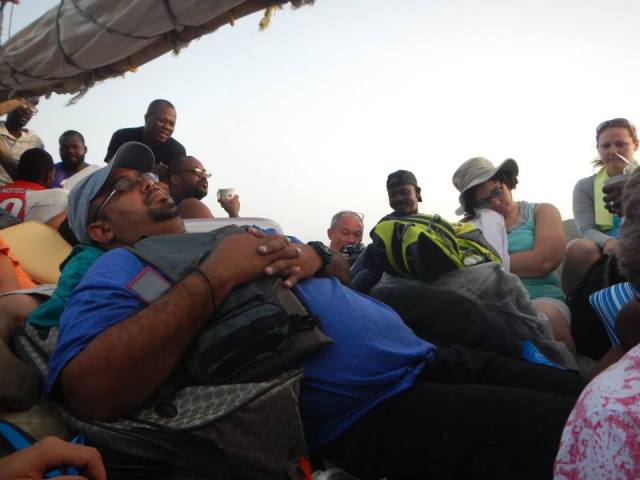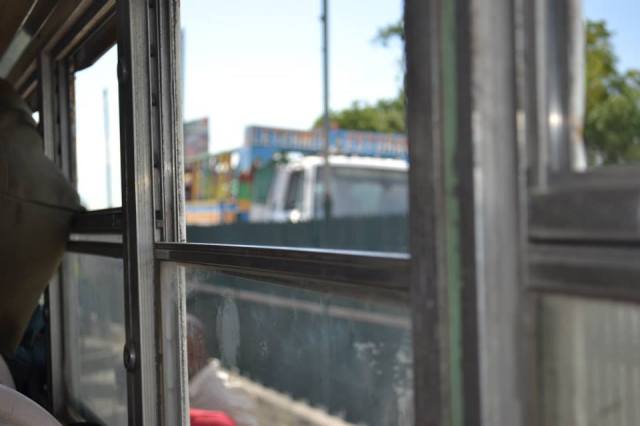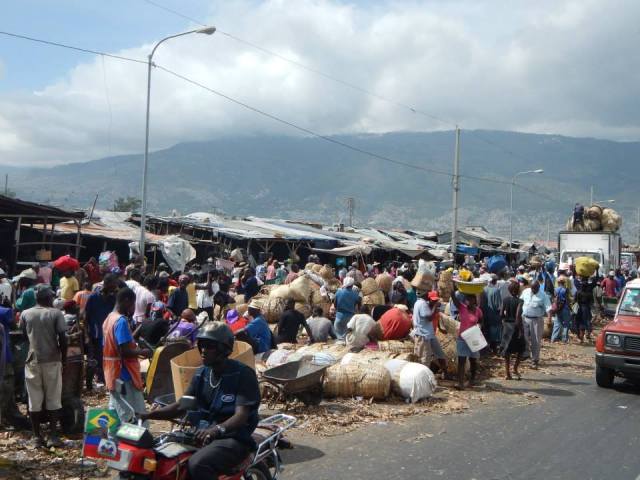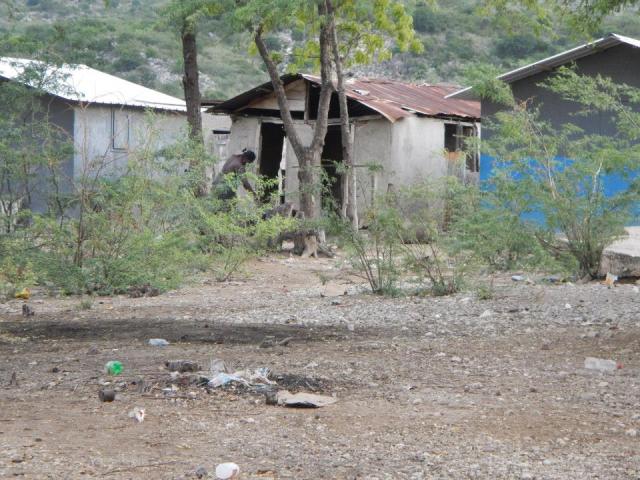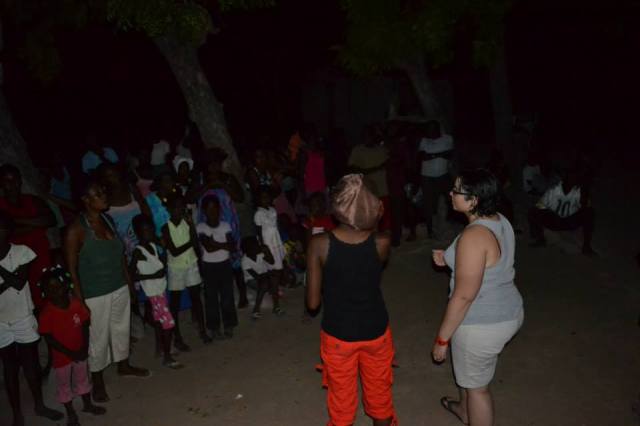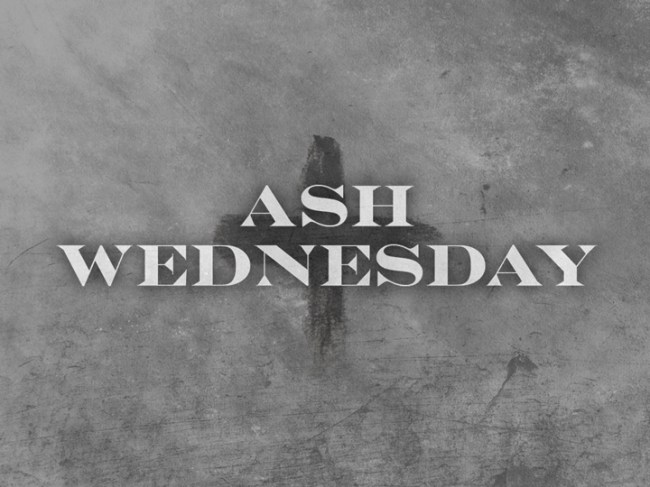I have this theory about being uncomfortable – I believe that we can’t grow spiritually without periodically experiencing it. I’ve written about this before, but last week I found myself on a very uncomfortable four-hour boat ride with people vomiting around me, and I thought to myself: Why do I do these things?!
This is not the first time I’ve been on this boat ride. This was my third trip to Haiti, and when I go to Haiti I go to the island of La Gonave where we visit the village of Picmy/Picmi/Pikmy. I’ll let you in on a secret, I do not like all that traveling to Picmy entails. I love Picmy, I love its people, I love the people I go to Picmy with, and I absolutely love going on mission trips. I do not remotely enjoy the 2-3 hour ride from the Port Au Prince airport, navigating with a group of people with tons of luggage through immigration, pushy Hatians who try to take your luggage so you pay them, and a hot, bumpy bus ride to the coast. Then comes the boat. The trip as a whole is challenigng on a physical, emotional, and spiritual level.
Truly, there were more challenges on this trip than I care to share or have the time to — from no AC, running water or plumbing, to cultural and community barriers and discord. However, half way through the long week, as I was walking back to our house in this dusty, perpetually hot existence, my feet filthy, no matter how much I cleaned them; my body sweaty and tired, thinking of all that I had to do the rest of the day to simply get ready for bed, and all that was left to do in the week, when again I thought to myself: Why do I do these things?! Why am I here? Then John 1 popped into my head:
In the beginning was the Word, and the Word was with God, and the Word was God. He was in the beginning with God. All things came into being through him, and without him not one thing came into being. What has come into being in him was life, and the life was the light of all people. The light shines in the darkness, and the darkness did not overcome it. And the Word became flesh and lived among us, and we have seen his glory, the glory as of a father’s only son, full of grace and truth.
-John 1:1-5, 14
I do this because Jesus- it’s called incarnational ministry – ministry in the flesh. God made God-self uncomfortable in the incarnation. I do this because in these places I find Jesus more clearly. Jesus is found where it’s hot and dusty and unpleasant: in deserts between borders, on islands where missionaries don’t return to, and in conversations with people who believe and live differently than we do.
I do this because it makes me uncomfortable. When we’re uncomfortable we’re stretched. We go beyond ourselves, our preconceptions, our preferences, and are able to allow God to blow up or expand our world. And again, when we’re uncomfortable, it’s more likely that we’re following Jesus on the dirty, incarnational path of discipleship. The coolest, most rewarding things that have happened to me in my life have all been a result of first being uncomfortable — sometimes for a while.
The awesome that happened–
Lest I make it sound like the week was completely horrible, I should let you know about some of the awesome things that happened (as usual, God working despite me and my inner grumbling). We successfully held VBS, a medical clinic, and began construction of a permanent clinic (the only one on that side of the island!). Around 20 people accepted Jesus as their God and Lord – many turning away from voodoo. Two of these folks were voodoo priests — one of them was baptized during our time there, the other one’s voodoo rag was burned. A beautiful baby girl was born at our clinic, and on our final night, our worship night, 14 people turned to Jesus and were prayed for individually.
Speaking as someone who dislikes being uncomfortable (I’m a recovering germ-a-phobe, for crying out loud), I’m aware that our culture, and unfortunately our church, is prone to thinking about what we want to do or be, and not much about the sacrifices and difficulties that result when truly following Jesus on the way to the cross.
So how can we apply these uncomfortable truths to ourselves as individuals? Do I only participate in things that I’m comfortable doing? When was the last time I was uncomfortable in my walk with God? How can we apply these principals to ourselves as a church/denomination? How/who do we serve? How/who do we welcome? Where do we visit? How do we spend money (or not spend money)? How are we intentionally making ourselves uncomfortable so that we may grow?
For the record, I still hate that boat ride. May God make us uncomfortable where we need to be uncomfortable… and may there be Dramamine.
Let’s pray:
Truth-telling, wind-blowing, life-giving spirit—
we present ourselves now
for our instruction and guidance;
breathe your truth among us,
breathe your truth of deep Friday loss,
your truth of awesome Sunday joy.
Breathe your story of death and life
that our story may be submitted to your will for life.
We pray in the name of Jesus risen to new life—
and him crucified.
-from Walter Brueggemann’s, Prayers for a Privileged People
(Thank you, Katie Dahlem and Allan Griner, for the photos!)
